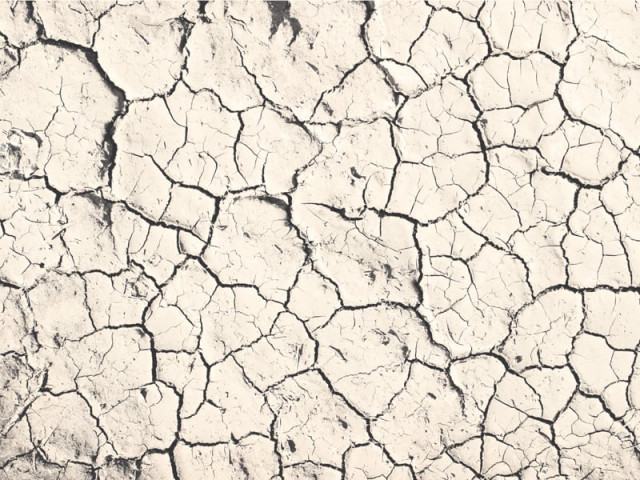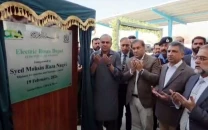A ticking bomb: ADB report warns of falling land productivity
Says rising salinity and deterioration of water quality will lead to serious problems in the future.

The study highlights the need for better water governance, aimed at sustaining ecosystems and ensuring economic use of falling levels of groundwater. DESIGN: ESSA MALIK
The agricultural sector, which forms the economic backbone of this 180-million-strong nation, is at risk of losing a fifth of productive arable land due to rising salt content in the soil. Irrigation-induced salination is reducing productivity and can ultimately render 20% of cultivated land unusable, states a report released by the Asian Development Bank, even as the country becomes increasingly exposed to serious water insecurity in the future.
Meanwhile, deterioration of water quality has also risen as a serious concern. The ADB’s findings show that the deterioration of water quality will limit water use, consequently threatening ecosystems and creating a drag on socioeconomic development.
The study highlights the need for better water governance, aimed at sustaining ecosystems and ensuring economic use of falling levels of groundwater.
The agriculture sector has a share of slightly over one-fifth share of the overall size of the economy. During the past few years, the country’s economic growth has sustained largely because of growth in the agricultural sector due to post-flood benefits and better returns on crops. In this period, a rampant energy crisis has severely affected industrial growth, and some sub-sectors of the services industry are consequently not performing well.

The study warns that Pakistan is already facing a hazardous situation on the index of national water security. The country needs to introduce some legislation and policy on water and the environment and boost public investment in the water sector, the report urges.
The report also highlights striking disparities between the rich and the poor of Pakistan in their access to water and sanitation. It found that the wealthy have better access to water supply than the poor, and that this disparity is growing. The rich have 92% more access to sanitation than the poor in Pakistan, says the report.
Only 36% of the households are water secure, and less than half of the population has access to sanitation. In urban areas, around six out of ten individuals have access to piped water supply, and slightly over a third of water waste is treated in the country.
Meanwhile, water-related hazards are also increasing, and flood losses have been estimated at $36.5 per capita.
Regional crises
The Asian Water Development Outlook (AWDO) report reveals that not even one out of 49 countries of the Asia Pacific region can be considered ‘water secure’. South Asia and parts of Central and West Asia are faring the worst, with rivers under immense strain, it adds.
In the Asia Pacific region, the study highlights two stark realities - sharply rising inequality in access to water and sanitation, and the increasingly precarious state of rivers. It also presents measures that can be adopted to improve water security to mitigate growing pressure from booming populations, urbanisation, pollution, over-extraction of groundwater, climate change and other factors.
It added that there are already signs of growing water scarcity and environmental stress in large parts of important agricultural regions in Asia. Groundwater levels are falling in northern India, Pakistan and the northern plains of China, it points out.
80% of the rivers in the region are in poor health, as measured by the river health index. South Asian and Central and West Asian rivers have been assessed as being in the poorest health. Azerbaijan, Bangladesh, Thailand, Pakistan, and Sri Lanka all have rivers that are in such poor health that environmental water security is threatened in these basins, the report warns.
Published in The Express Tribune, March 14th, 2013.
Like Business on Facebook to stay informed and join in the conversation.



















COMMENTS
Comments are moderated and generally will be posted if they are on-topic and not abusive.
For more information, please see our Comments FAQ